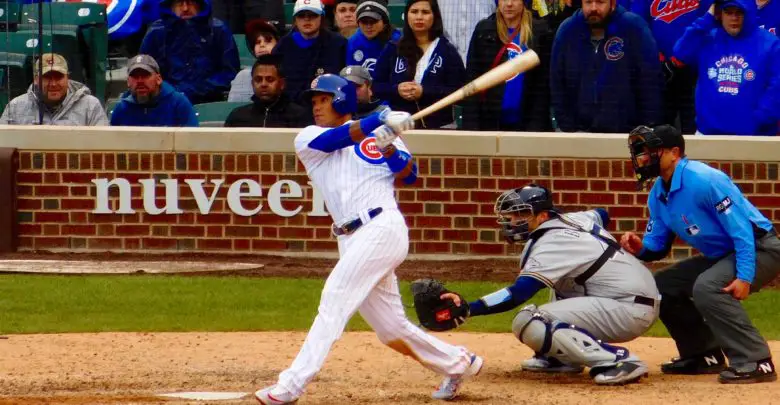
Addison Russell Candidate for What Could Be ‘Larger-than-Usual’ Non-Tender Pool
The deadline for teams to tender contracts to arbitration-eligible players is coming up on November 30, a date that bears significance when it comes to the Cubs and Addison Russell. There could be some bigger ramifications across the league as a whole also, but we’ll get to that in a just a bit.
Theo Epstein spoke openly about how the Cubs are viewing Russell, who will need to complete the remainder of a 40-game domestic violence suspension before he’s able to return to the field next season. Whether he remains in Chicago depends on how the Cubs value him as both a player and a person, and they’ve only got about two more weeks to make that determination.
“The solution also means, with respect to Addison, it means discipline,” Epstein said during the GM Meetings. “And he’s been handed his discipline and he’ll serve it. I also think part of the solution can possibly include rehabilitation and reformation. And taking steps to examine whether the individual is worth the investment so he can grow so that this never happens again with him.
“So we’re in that process. We have a robust mental skills department. I don’t want to get into specifics, but we’re very engaged with Addy in trying to verify that he’s serious about self-improvement and adding more stability in his life to get to a point that we’re confident that something like this will never happen again.”
Of course, any decision is also going to be based largely on money and Russell is projected to earn $4.3 million next season. While it’s a paltry sum in terms of today’s MLB economics, the investment clearly carries a little more risk in this case. That’s why MLB Trade Rumors has Russell listed among 51 non-tender candidates out of more than 200 arb-eligible players.
Keep in mind that it’s not simply a matter of the Cubs either offering Russell a deal or letting him become a free agent. They could move him in a trade if another team is willing to accept the accompanying PR hit in exchange for the talented shortstop’s potential. And even though Epstein’s comments about being part of the solution seem to indicate a willingness to work with Russell, that rhetoric should be taken with a grain of salt.
One interesting wrinkle in this situation could come from the other 50 names, and perhaps more, from that non-tender list. According to Jeff Passan, teams may introduce a flood of non-tendered players into what is already a saturated free-agent market as a means of manipulating demand and driving contract values down.
One veteran market reader today predicted a larger-than-usual number of non-tenders at the end of this month. With free agent volume so high, adding more players to the market could depress prices even more and drive players to accept what in the past would've been subpar deals.
— Jeff Passan (@JeffPassan) November 16, 2018
If teams feel they’d be able to get a great deal on a young middle infielder as a result of this potential glut, they might not be as willing to work out a trade with the Cubs. And if prices are depressed by a deeper talent pool, it’s that much easier for a team to scoop Russell up as a free agent. The Cubs would certainly like to avoid the possibility of simply giving away a talented player, but there’s also the matter of just cutting him loose to be someone else’s problem.
The Cubs being serious about affecting change in regard to domestic violence doesn’t mean they have to keep Russell, but it does mean they bear some responsibility when it comes to where he ends up. And while I’m not going to pretend their motives aren’t primarily motivated by baseball needs, the human side is going to factor.
Non-tendering Russell means his fate is solely in his own hands and those of whatever team picks him up. Of course, Scott Boras, Russell’s agent, may well have a say in the matter. The Cubs aren’t beholden to Boras, but they have to deal with him when it comes to other players, particularly Kris Bryant. Maybe Bryce Harper as well, though that feels like more of a formality at this point.
So in addition to the reasons listed above, you have to figure the Cubs will work very closely with Boras when it comes to Russell’s future. How exactly that plays out remains to be seen, but we’ll find out more by the end of the month.
